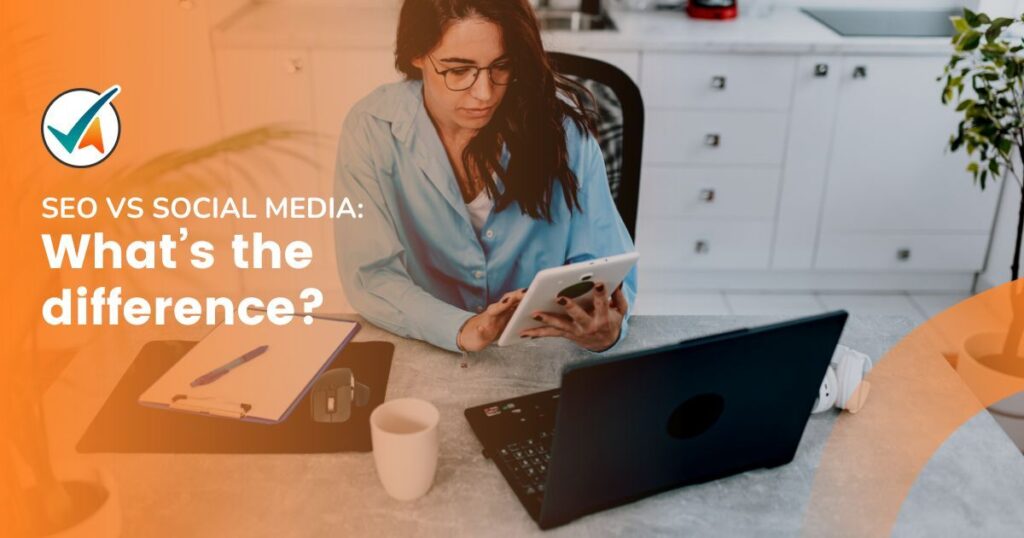SEO vs Social Media: What’s the difference?
Developing an effective marketing strategy requires a careful balance of time and resources, especially when considering the dynamic landscape of SEO and social media marketing. In this digital era, where online presence is paramount, businesses often face the dilemma of where to allocate their focus for optimal returns. Let’s explore the crucial aspects of SEO and social media marketing, the differences between the two, and why a combined approach is often the key to success.
SEO vs Social Media: Understanding the Differences
Both SEO and social media are integral components of a comprehensive digital marketing strategy, each offering distinct benefits. SEO, or search engine optimization, is a powerhouse for achieving high rankings in search engine results. It involves strategic keyword optimization, formatting, and link building to enhance visibility and attract organic leads. On the other hand, social media marketing focuses on building online relationships and engaging with buyer personas through platforms like Facebook, Twitter, Instagram, and YouTube. These platforms serve as vital tools for promoting products, creating brand awareness, and achieving sales goals.
Key Differences Between SEO and Social Media Marketing
1. Underlying Purpose:
- SEO: Aims to achieve higher ranking content on search engine results pages, providing valuable information to the target audience based on identified keywords.
- Social Media Marketing: Primarily concerned with building relationships and engaging with buyer personas, creating brand awareness, and directing traffic to the website through a strong social presence.
2. Identifying the Targeted Audience:
- SEO: Involves researching and identifying buyer personas based on data, tailoring strategies to specific search queries and audience preferences.
- Social Media Marketing: Analyzes demographics on social media platforms to identify user preferences and interactions, directing attention and budget to the platforms with the most significant impact.
3. Type of Content:
- SEO: Focuses on providing informative, research-based content that answers questions or provides knowledge to the target audience, often in the form of long-form content on web pages, blogs, and articles.
- Social Media Marketing: Prioritizes short-form or visual content that elicits emotion, encourages engagement, and contributes to brand awareness on platforms with fast-paced content consumption.
4. Measuring Results:
- SEO: Requires patience as search engines take time to index content. Key performance indicators (KPIs) focus on traffic, click-through results, and continuous effort for long-term success.
- Social Media Marketing: Provides quicker feedback as social media is a fast-changing environment. KPIs include levels of engagement (likes, comments, shares), allowing for instant analysis and adjustments.
5. Number of Sites/Platforms:
- SEO: Focuses on a limited number of search engine sites, allowing for efficient use of time and resources.
- Social Media Marketing: Involves managing multiple platforms, which can be time-consuming and costly but offers diverse opportunities for engagement.
The Benefits of an SEO Strategy
SEO is focused on optimizing a website for search engines, providing several benefits:
- Higher Traffic: Search engines generate more traffic to a website than all social media sites combined.
- Improved Visibility: SEO enhances a website’s visibility, leading to increased recognition and trust.
- Establishing Authority: A well-implemented SEO strategy helps in establishing authority and gaining trust among the audience.
- Reporting and Analysis: SEO allows for continuous reporting, analysis, and tracking of KPIs, providing valuable insights.
The Advantages of a Social Media Plan
Social media marketing has evolved beyond being just a platform for interactions, offering several advantages:
- Efficient Marketing: A social media plan keeps marketing efforts organized, focusing on goals such as brand awareness, engagement, and conversions.
- Targeted Goals: Helps in defining important goals, enabling efficient social media marketing with measurable key performance indicators.
- Building Brand Awareness: Boosts brand visibility by sharing shareable content and engaging with target audiences.
- Interacting with Audiences: Provides opportunities for direct interaction with audiences, encouraging engagement and building relationships.
- Utilizing Influencers: Enables strategies involving influencers, backlinks, and reviews, contributing to brand growth.
SEO vs Social Media: Finding the Right Balance
When deciding whether to focus more on SEO or social media, it’s essential to consider both the strengths and weaknesses of each. While returns from social media may be smaller compared to SEO, a combined effort often yields the best results. The synergy between the two approaches contributes to the overall success of a digital marketing strategy:
- Boosting Traffic: SEO ensures content is searchable, while social media rapidly puts it in front of a targeted audience.
- Improving Strategies: Social media helps in locating and understanding the audience, guiding SEO efforts to target specific demographics.
- Enhancing Visibility: The two complement each other by linking SEO-optimized content to graphics shared on social media, improving content discoverability.
- Controlling the Budget: A combined strategy optimizes time and resources, allowing for efficient planning and execution.
The Bottom Line: Embrace Both SEO and Social Media
In the ongoing “SEO vs Social Media” debate, the truth lies in embracing both. Each complements and benefits the other in unique ways. While SEO brings visitors to the website, social media engagement leads to increased webpage traffic, contributing to improved search engine rankings. The combination of a steady SEO progression and dynamic social media engagement creates a holistic digital marketing strategy.
SEO is a long-term investment, continuously bringing traffic through informative content, educating, and entertaining the audience. On the other hand, social media is a hyper-strategy, constantly engaging with the audience, staying on pulse, and providing instant feedback.In conclusion, a balanced approach, leveraging both SEO and social media, ensures a comprehensive digital marketing strategy. Slow and steady progress combined with dynamic engagement can lead to faster and sustained results. Nowadays, businesses need both SEO and social media to thrive, connect with audiences, and stay ahead of the competition. If you desire to get a head start on your SEO we offer FREE WEBSITE AUDIT. Connect with Oneva Hub Digitals solutions today!




Comment (1)
order cialis uk
February 5, 2024order cialis uk
order cialis uk
Comments are closed.